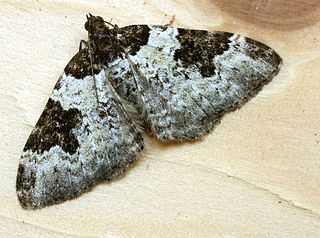
The garden carpet is a moth of the family Geometridae. It is an abundant and familiar species across its huge range which covers the whole Palearctic region from Ireland to Japan and including the Near East and North Africa. It was first described by Carl Linnaeus in his 1758 10th edition of Systema Naturae.
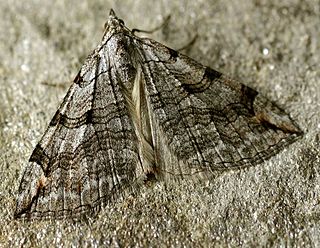
The treble-bar or St. John's wort inchworm is a moth of the family Geometridae. the species was first described by Carl Linnaeus in his 1758 10th edition of Systema Naturae. It is found throughout the Palearctic region and the Near East.

The swallow-tailed moth is a moth of the family Geometridae. The species was first described by Carl Linnaeus in his 1758 10th edition of Systema Naturae. It is a common species across Europe and the Near East.

Angerona is a monotypic moth genus in the family Geometridae erected by Philogène Auguste Joseph Duponchel in 1829. Its only species, Angerona prunaria, the orange moth, was first described by Carl Linnaeus in his 1758 10th edition of Systema Naturae.
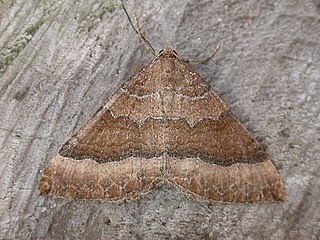
Larentia clavaria, the mallow, is a moth of the family Geometridae. The species was first described by Adrian Hardy Haworth in 1809. It is found from Siberia in the east to the Iberian Peninsula, North Africa, and the British Isles in the west. In the north it ranges to the Caucasus, Tajikistan and Fennoscandia. In the south it is found the western Mediterranean islands, Italy, the Balkans and Asia Minor. It occurs only locally and is almost always rare. In the Alps, it rises up to 1200 m above sea level.

Aeolochroma is a genus of moths in the family Geometridae described by Prout in 1912.

Bosara is a genus of moths in the family Geometridae.

Alcis is a genus of moths in the family Geometridae described by John Curtis in 1826.

Cyclophora is a genus of moths in the family Geometridae. Many species are referred to as mochas in reference to their colouration, primarily in Europe.

Epigynopteryx is a genus of moths in the family Geometridae. The genus was described by Warren in 1895.

Scopula is a genus of moths in the family Geometridae described by Franz von Paula Schrank in 1802.

Scopulini is a tribe of the geometer moth family (Geometridae), with about 900 species in seven genera. The tribe was described by Philogène Auguste Joseph Duponchel in 1845.
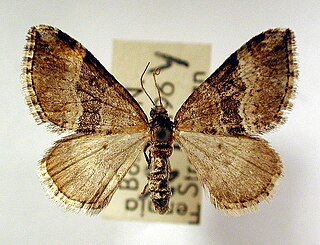
Perizoma bifaciata, the barred rivulet, is a moth in the family of geometer moths (Geometridae). It was first described by Adrian Hardy Haworth in 1809.
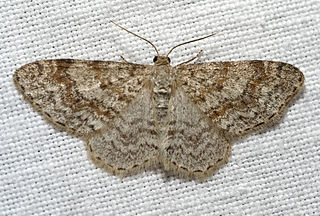
Asthenini is a tribe of geometer moths under subfamily Larentiinae first described by Warren in 1893. The tribe has been combined with Eupitheciini in the past, most notably by Jeremy Daniel Holloway in his work The Moths of Borneo.

Perizoma blandiata, the pretty pinion, is a moth of the family Geometridae. The species was first described by Michael Denis and Ignaz Schiffermüller in 1775. It is found from most of central and northern Europe to central Asia as far as the Khangai Mountains.
Louis Beethoven Prout (1864–1943) was an English entomologist and musicologist.
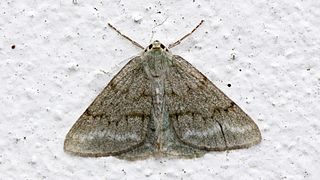
The Pseudoterpnini are a tribe of geometer moths in the subfamily Geometrinae. The tribe was described by Warren in 1893. It was alternatively treated as subtribe Pseudoterpniti by Jeremy Daniel Holloway in 1996.
Epigynopteryx maeviaria is a moth of the family Geometridae. It is found in subtropical Africa and is known from Angola, Congo, Kenya, Malawi, South Africa, Tanzania and Zimbabwe.
Rhodostrophiini is a tribe of the geometer moth family (Geometridae), with about 200 species in 17 genera and five genera tentatively associated with the tribe.

Sterrhini is a tribe of the geometer moth family (Geometridae), with about 825 species in 19 genera. There are also 6 genera with 36 species tentatively associated with the tribe. The tribe was erected by Edward Meyrick in 1892.















